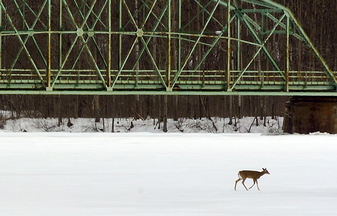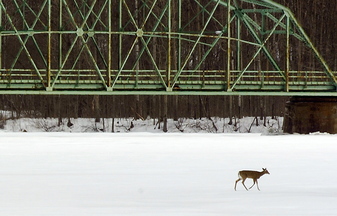After 45 deer-vehicle collisions in 31 days on Waldo County roads, Chief Deputy Jeff Trafton issued a warning.
“I’m not sure why it is up so much. It seems like an awful lot,” he said.
State officials say there may be more of the same this year because of an increase in the deer population.
An average of one out of every 207 drivers in Maine will hit a deer – the greatest risk of any state in New England except Vermont, where the chance is one in 180, according to Rennaisance Insurance Alliance, a group of New England independent insurance companies. The number of vehicle collisions with deer is 2,600 to 3,000 a year, a range that has remained steady since 2008.
The chance increases in November, the mating season. In the last decade, 19 percent of the state’s deer collisions have occurred in November, according to the Maine Department of Transportation. The third week of November is usually when the number of deer collisions peaks.
Kyle Ravana, the state’s deer biologist, said most regions in Maine are within or close to their goal population range of deer. Population ranges are set by considering the biological carrying capacity, and social factors such as hunters’ desires for a bountiful season and the need for traffic safety.
The goal populations are re-evaluated every 15 years, and Ravana said they may change in 2015.
State officials are warning drivers to look out for more deer on the roads this winter, because herds have recovered from severe losses several years ago.
About a third of the state’s deer died during the 2008-09 winter, but the population has rebounded since then to about 200,000, according to the state deer biologist.
To minimize the risk of a deer collision, drivers should travel more slowly in areas posted with deer crossing signs, use high beams when possible and remain aware of their surroundings.
Someone driving 50 mph would drive about 175 feet before reacting to a deer, and it would take about 400 feet to stop, according to the Department of Transportation. It would take someone driving 70 mph 250 feet to react and about 725 feet to stop. There have been three fatalities in the state over the past decade from deer-related collisions, compared to 22 fatalities from moose-related collisions.
Kaitlin Schroeder can be contacted at 861-9252 or at:
kschroeder@centralmaine.com
Send questions/comments to the editors.






Success. Please wait for the page to reload. If the page does not reload within 5 seconds, please refresh the page.
Enter your email and password to access comments.
Hi, to comment on stories you must . This profile is in addition to your subscription and website login.
Already have a commenting profile? .
Invalid username/password.
Please check your email to confirm and complete your registration.
Only subscribers are eligible to post comments. Please subscribe or login first for digital access. Here’s why.
Use the form below to reset your password. When you've submitted your account email, we will send an email with a reset code.